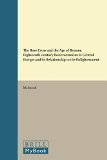

 |

|

The average rating for The rose cross and the age of reason based on 2 reviews is 4 stars.
Review # 1 was written on 2020-05-17 00:00:00 Jaycee Conde Jaycee CondeThis is a very interesting look at the social history of the radical side of the enlightenment. If you want to understand the constructive nature of the Masonic movement. it's a great read. If you want to understand the "republic of letters" it's a great read. But something this book accomplishes that probably gets glossed over in the whole desire to understand the "secret society" aspects of information trafficking in the 1700's, is the number of really excellent connections Jacob makes between things our minds compartmentalize as discrete subjects. One of the first of these zingers, is the influence of the English Civil War on the reform movements, both in England and on the Continent. Phrased like that it doesn't sound earth shattering, but for the people who lived in terror of Catholic invasion and the loss of their immortal souls to improper theology of various stripes, it was a formative experience. On top of the horrors of any Civil War, fought in your own yard, sometimes against your neighbors, there was a sense the universe itself might be in danger, and truly the world turned upside down. Regicide is hard to face if you believe in the divine right of kings, and divine providence ensuring the smooth function of day to day life. In the days before we sat glued to computer screens, people spent hours listening to sermons that went on for hours, and then spent days, discussing theology in relation to just about everything. It is harder for us to see the implications of atomic conception on politics, theology and history. This author was helpful illustrating many things I dimly grasped in my graduate school education, particularly with the factions in England, the Royal Society and in Continental politics. She explains it in a compassionate way, as to why things like pantheism were more than intellectual dry bones set out to make the dogs fight. Like all good educational experiences, I am inspired to read more. |
Review # 2 was written on 2013-10-25 00:00:00 KEN ERRARA KEN ERRARAJacob sees the pantheism of the 'radical enlightenment' arising during the English revolutions of the 17th century, and inspired by Giordano Bruno's vital materialism. Carried by such people as Toland to the Netherlands in the early 18th century they served to inspire radical materialist ideas such as those of d'Holbach later in that century. At the same time a 'moderate' Enlightenment, which gave a role to God, either Christian or deist, and was inspired by Newton became very influential in France through such figures as Voltaire. At least this is my understanding of the general outline of one of Jacob's themes. In addition she has much to say about Freemasonry and secret societies that supported the 'radical Enlightenment.' This was of less interest to me. While this is a very rich and complex book, I was pleased with the clarity with which Jacob writes. I have read about this period and some of its ideas, but I feel that I have a significantly clearer understanding after reading portions of this book. |
CAN'T FIND WHAT YOU'RE LOOKING FOR? CLICK HERE!!!